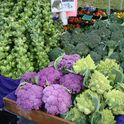Recipes that call. For 'cups' of things.How does one convert these. To. Grams? (Or. Ounces)
Not. Used. To. Measuring. Things. With. 'Cups'
15 Comments
AmyAugust 12, 2015
I have searched high and low (I am a baker), and the best conversion I have found is www.convert-me.com It's not 100% foolproof, but I find that most of the time, the conversions are spot on. On the left side, click on the conversion for cooking, then type your ingredient in the search box, pick what you want, type your measure in the right box (ie: cups or teaspoons or whatever) and it converts that measure of that ingredient into about 40 different units. The only "off" ingredient I have found so far was sour cream. Otherwise, it's not bad.
AntoniaJamesAugust 12, 2015
Amy, as a baker what do you do when a recipe for, say, a cake calls for 2 cups of flour? Given the variability in actual grams/cup from baker to baker (I noted some examples, within Food52 recipes, in another comment), I'm curious as to whether you have any insights or a reliable standard for this. Thank you. ;o)
PieceOfLayerCakeAugust 11, 2015
Even more of a reason to just find recipes that are already metric :) If I need a recipe for genoise, I don't bother looking for one written volumetrically and then attempt a conversion, I find one that suits my needs. The problem with any volume to weight conversion is: we can never be sure what the cup of flour weighed during the time that recipe was tested (if it was tested at all)...so our conversion is a guess at best.
AntoniaJamesAugust 11, 2015
It also depends a lot on who wrote the recipe, and how they happened to be measuring that day. In a brief random survey of recipes posted by Food52 editors which contain both grams and cups, I noted the following gram conversions for 1 cup of flour: 125, 132, 140, 144 (these from 3 editors who provides a lot of baked goods recipes and articles - one had a recipe with a 132 gram cup of flour and another recipe with a 125 gram cup), and 128-130 (from another editor, in response to a Hotline question); a Hotline response from a community member came in at 146 grams per cup. King Arthur Flour and bags of all-purpose flour produced by other national brands in the U.S. give a 120 grams / cup ratio. Clearly, it's risky relying on conversion charts for ingredients like flour.
I've found that conversion tables tend to work reasonably well for items like sugar of all kinds, peanut butter, rice, etc.
For recipes calling for flour, however, I now generally stick to recipes tested and written in grams, except where variability doesn't matter too much, e.g., streusel toppings, and pancakes and similar batters that allow for greater flexibility in how thick they are, etc.. ;o)
I've found that conversion tables tend to work reasonably well for items like sugar of all kinds, peanut butter, rice, etc.
For recipes calling for flour, however, I now generally stick to recipes tested and written in grams, except where variability doesn't matter too much, e.g., streusel toppings, and pancakes and similar batters that allow for greater flexibility in how thick they are, etc.. ;o)
702551August 11, 2015
A cup is a volumetric measurement. The metric conversion is 2.37 deciliters per 1 US cup.
If you are transcribing US recipes into the metric system, first measure out the equivalent volumetric amount in deciliters, then weigh this amount. Write that down for that specific recipe.
Volumetric measurements are stupid for anything but smallish quantities (like teaspoons) or liquids, but American recipe writers still haven't figured this out yet.
If you are transcribing US recipes into the metric system, first measure out the equivalent volumetric amount in deciliters, then weigh this amount. Write that down for that specific recipe.
Volumetric measurements are stupid for anything but smallish quantities (like teaspoons) or liquids, but American recipe writers still haven't figured this out yet.
sonyaAugust 11, 2015
It depends on the ingredient. A cup of one ingredient will weigh differently than a cup of another ingredient. Here is a great "cheat sheet" to get you started:
http://www.kingarthurflour...
http://www.kingarthurflour...
WileyPJune 22, 2015
Anyone who would like the Excel spreadsheet may simply send a private message to me with their email address and I'll send a copy to you.
DeniseJune 22, 2015
You. Are. Most. Kind.That would. Be. Very. Helpful.Some. American. Recipes. Are. Gorgeous but I. Find. The. Measurements. Difficult.I. Can. Do metric. And. Imperial(pounds ounces. Etc.) but. 'Cups' are. Baffling!! Thank. You
WileyPJune 22, 2015
Denise, there's a little problem in answering your question. You see, "cups" is a term for for measuring volume, and while ounces and grams is a measurement of weight. (Actually, ounces can be either volume or weight, but not both). So the conversion from cups to ounces or grams of weight would depend on what you are measuring.
I do have a fairly complete excel spreadsheet with most baking products broken down into tablespoons, cups and their associate grams as well as a number of other conversion charts. I'd be happy to send you (or anyone else) a copy.
I do have a fairly complete excel spreadsheet with most baking products broken down into tablespoons, cups and their associate grams as well as a number of other conversion charts. I'd be happy to send you (or anyone else) a copy.
SmaugAugust 11, 2015
Grams are actually mass, not weight, though it doesn't matter much in the kitchen.
AntoniaJamesAugust 12, 2015
Thank you, oldunc. I suspect that many people would not understand "mass," but I for one appreciate the reminder. ;o)
PieceOfLayerCakeJune 21, 2015
Its an inexact science....I just look for recipes that have been written in metric to begin with. I tend to go to the same reputable sources for recipes, and trust their weight measurements are tested.
SandraJune 21, 2015
Kingarthurflour.com has a very helpful page with equivalent weights of things. I've printed it out and tacked it on my fridge for easy access.
boulangereAugust 11, 2015
I use their conversions often, as well, Sandra. It is several pages long, but very useful for weight conversions for, say, one cup of macadamia nuts, or a half cup of dried apricots.
AntoniaJamesAugust 12, 2015
I didn't know about the long conversion table. I often use the nutrition data on packages sold in the U.S., which give metric weights for dry ingredients, as well as standard US volume measures. (I like doing the math in my head! Really.)
The table you mention, Sandra, will be helpful for the many bulk items I purchase -- other than flours, unless the recipe is from KAF, in which case I won't need the conversion table because they, bless their hearts, have a tool built right into their site that does it for us! ;o)
The table you mention, Sandra, will be helpful for the many bulk items I purchase -- other than flours, unless the recipe is from KAF, in which case I won't need the conversion table because they, bless their hearts, have a tool built right into their site that does it for us! ;o)
Showing 15 out of 15 Comments
Recommended by Food52
Popular on Food52
Continue After Advertisement






